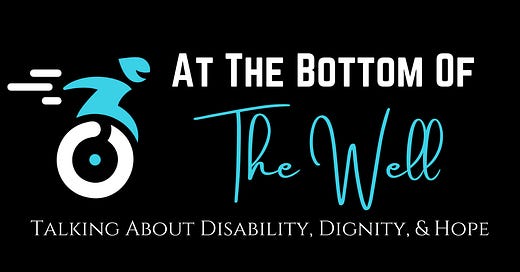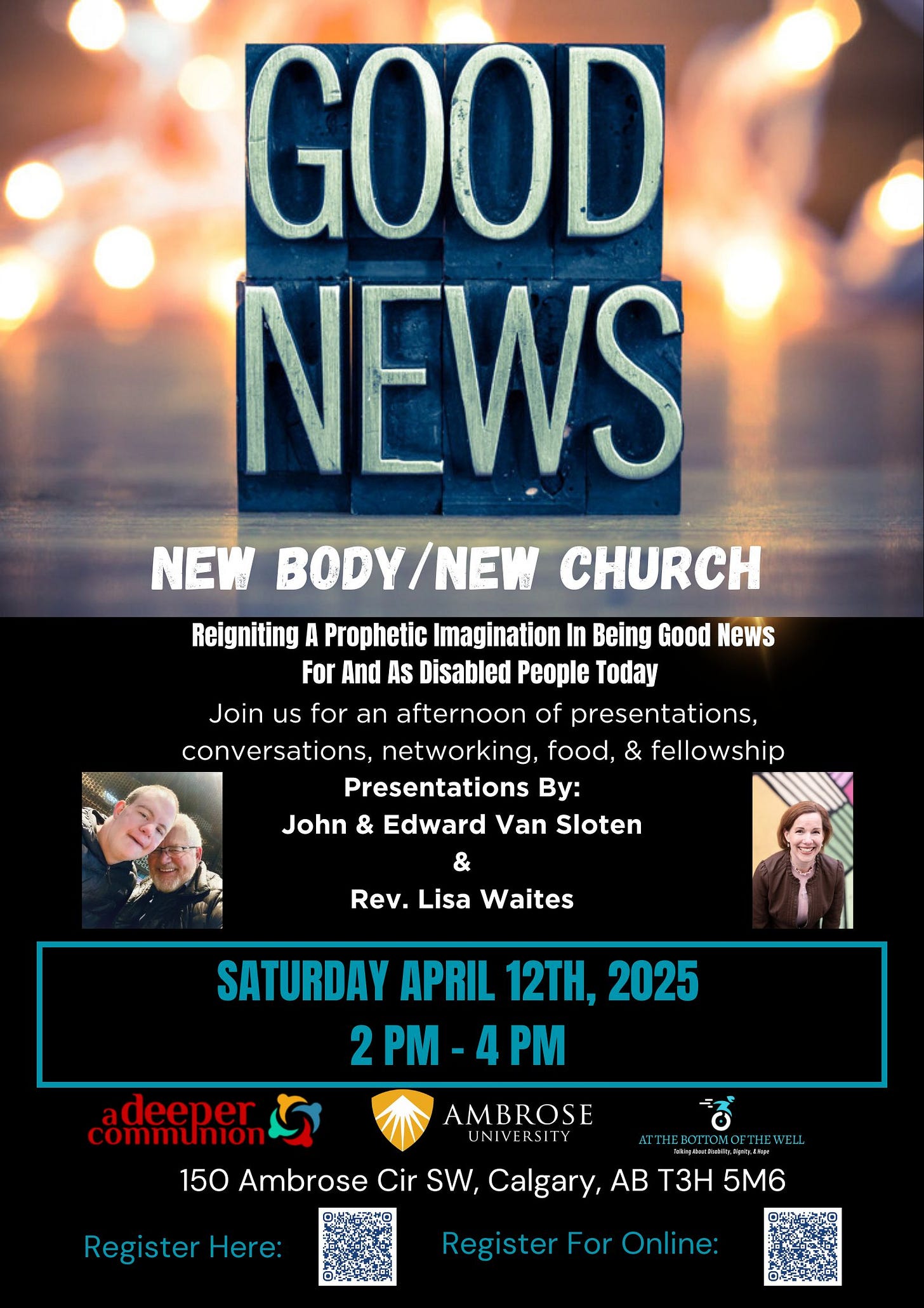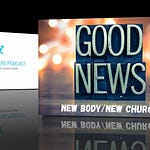“The main stimulus for the renewal of Christianity will come from the bottom and from the edge, from sectors of the Christian world that are on the margins.”
― Alan Hirsch, The Permanent Revolution: Apostolic Imagination and Practice for the 21st Century Church
I. Introduction
Let me start by saying that I really suck at evangelism! No matter what “gift” profiling test I take, it is always at the bottom of the list. So what gives? Am I really that bad at it? Or is the Church looking for a certain kind of evangelism that is not in my gifted identity?
Either way, a few weeks ago I had the opportunity to attend the Advance Summit here in Calgary, thankfully with the support of my church family at First Alliance. Not only did it give me the chance to explore my understanding of evangelism within the disabled context, I was also able to catch up with and see my old friend, Alan Hirsch.
I must admit to being a little uncomfortable there throughout the summit. Yes, I was the only one there who was in a wheelchair. But that wasn’t it. Sadly, that is a common reality I’ve experienced for most of my life in Church leadership events. (Perhaps that says something about evangelism and the inclusive systemic struggles with ableism in the Church.) No, my uncomfortability came from listening to some of the old language around the table discussions I was a part of, which for the most part seemed to focus on getting the unchurched into the church and converting the masses to a membership status. It was like nothing had changed culturally since my early childhood in the 80’s and 90’s which for me, was not good news.
That is not to say the summit was a wash. It simply framed my being there with a reality in knowing that radical evangelism for and as disabled people is not about increasing church membership. Radical evangelism begins by us embodying the marks and life of Jesus amidst the ableist social struggles and people God has placed us within.
To explore the state of the Church’s evangelism, perhaps a key question we might ask ourselves is: If the marks of our evangelism do not create space for disabled people inclusively, enter the daily lives and activities they are a part of, address the oppression and injustices they struggle against both politically and socially, and acknowledge the presence, wisdom, and strength of Jesus within them, is it truly the gospel?
Ultimately, authentic evangelism is radicalized when we are willing to see its markers placed amidst the people who are at the bottom, the edges, and the greatest margins of our social communities and not within the membership or attendance of Sunday morning church services. It has been my experience that this description fits more often than not, with physically and cognitively disabled people of today.
II. Evangelism Starts with Embodying Jesus
I grew up in an Anglican church community while going to a Catholic elementary school. Evangelism was taught to me through two processes: the first was the school catechism. And the second was more an evangelical system of repentance for sin, acceptance of Jesus as embodied in the church leadership and authority, and sacramental participation. The idea of relational and emotional connection to daily life outside of church activities and service seemed distant at best; if not dismissed as irrelevant with the label of being secularist. Marge Piercy describes my experience perfectly saying:
“I have no connections here; only gusty collisions, rootless seedlings forced into bloom, that [run the risk of soon] collapsing.”1
It is probably why I soon left the church after my spinal cord injury when I was 15 years old and found myself struggling in a new identity of being disabled and in a wheelchair. The Church simply lacked relevance to my ability to fully participate and be part of my life experience with suffering in marginalization.
Perhaps that is why Alan Hirsch’s words came like a breath of fresh evangelistic air when he described discipleship through a three step movement that began not with church attendance, but in the daily life encounter with an embodied present Jesus.
“If we are going to be genuinely Christlike, we will not be conformists! For one, our Lord can hardly be called a conformist. He disturbed the status quo, railed against injustice and lack of mercy, hung out with highly questionable people, and fomented a revolution that called for the overthrow of religious oppression.”
― Alan Hirsch, Untamed: Reactivating a Missional Form of Discipleship
Evangelism as and with disabled people can’t be framed through a forced involvement of inaccessible attendance or cultural ableist dismissal of involvement; it is perhaps best framed through the approach of three markers in practice.
Embodiment of Jesus – We look, act, smell, and sound like Jesus as depicted in the four gospels. This means entering the daily lives of disabled neighbours in our communities and becoming involved in their personal and social needs — physical care, financial support, government advocacy, health requirements, social activities and hobbies, etc.
Missional Calling – Seeing the working presence of God in the embodied work of Jesus with the disabled today as the missional responsibility of the Church and the describing call to take action as a community. To coin a now old phrase, the Church does not have a mission; the mission has a Church.
Authentic Community/Ecclesiology – Finding a rhythm of worship that is not institutionally static but actively finding new expressions of gratitude, celebration, liberation, transformational, and communal traditions rooted through disabled fellowship that is inclusively experienced in the community whole.
We can start the conversation not with where a disabled person will find themselves when then die, but rather asking what Jesus encountering story do they have to share with us all today?
III. The Dangers of Unhealthy Evangelism
Over three days at the Advance Summit I found a deep history in several of the conversations I had including those who bravely smuggled Bibles into China, street ministries like that of Heath Meikle who live with those on the outskirts of acceptance, and some budding house church ministries that brought fond memories to my own past community practices of belonging and leadership.
But there was one encounter that seemed to reveal a place of undeserved shame in my heart. And in reflection, highlighted some dangers of unhealthy evangelism, in my opinion.
I was sitting at a table following dinner and a gentleman came over and sat down beside me. “So, are you a pastor?” I could absolutely be wrong here but, the question seemed rote with the traditional expectation of evangelical hierarchy and authority.
I said, “No.”
Following up, he then asked, “Then what do you do?”
Trying not to seem like the little person amongst giants, I answered, “I advocate for disabled people by writing on a blog site and hosting a podcast called…” It seemed as though I already had lost his interest and it was just a minute later when he would get up and leave the table.
What was I to learn from this experience in relationship to my evangelistic skills?
Humbly I offer two reflections in the dangers of unhealthy evangelism using language and presentations from those three days.
The first is something Hirsch called the Sin of Reductionism or simply, reducing the gospel from a commitment of lifetime relational sharing to the event expectation. When we desire to experience the gospel with and as disabled people, we cannot enter relationships with expectations of participation or even communicated understanding through short events or encounters. They are relationships and communications of love through enduring longevity.
One of my favorite quotes from Voltaire says that, “The burning of a little straw may hide the stars. But the stars outlast the smoke.” And believe me when I say from experience, there is a lot of smoke in the disabled person’s life. But stars always burn brightest through the ones who are always there through it all.
To share the presence of Jesus with disabled people, we must be willing to outlast the smoke before we can see and experience the good news of bright shining stars.
Discipleship, evangelism, and spiritual growth are not about reducing a person’s journey to a single moment or encounter — whether that be attending an event, reciting a confessional prayer, or conforming to a specific model or expectation of leadership. Instead, radical evangelism requires us to see, honor, and participate in the fullness of their story — their struggles, questions, and experiences — as part of a larger process of transformation. When we shift our focus from immediate responses to the long-term shaping of a life, our encounters become more authentic, our relationships more rooted in grace, and our leadership more reflective of Christ’s own patient and loving way of embodying good news.
The second danger I reflect back upon, was revealed in a presentation shared by Travis Holownia from Resurgence Initiatives. In honesty, I joined his presentation of the ‘Soul of the Evangelist’ as I knew my friend and past MRE Alumni, Daunavan Buyer, was part of this movement and I hoped to learn more about it. But as Travis’s words spoke of the trap of comparison, it pierced deeply into my soul.
To illustrate, I return to the story I shared with you a few moments ago about the gentleman who came over and sat briefly at my table. Without any real tact or awareness, his question opened a deep vulnerability and wound within me. I found myself instantly confronted by the internal questions:
Who am I to think I belong here amongst all these community pastoral evangelists?
What do I really think I have to share and contribute in this conversation about sharing “the gospel”?
Deeper still, I told you at the beginning of this post that I really suck at evangelism. In honesty, after 24 years of ministry and 46 years of life, I don’t think I have ever lead anyone to Christ — at least in the sense of confessing his authority as Lord and accepting communal baptism.
By assuming I was a pastor by title and seemingly dismissing my meager efforts in advocating for the disabled community as uninteresting at best, I felt very out of place and sensed that I did not belong.
More often then not, churches tend to measure success by visible engagement, sidelining those who cannot participate in conventional ways. Evangelistic accomplishments, or “fruitfulness”, is measured through numerical conversional performance or achievements.
Enter in the trap of comparison, and I quickly found myself reflecting the darkness of Saul’s internal madness while hearing the words metaphorically… “Saul has his thousands, but David his tens of thousands!” (1 Sam. 18:7)
There is definitely some personal responsibility in this struggle. I work on it every day. And yet, the sin of comparison is also a systemic struggle to which the Church must seek communal reformation within the language, practices, and acts of evangelistic understandings. Success and maturity must not be performance or able based; but rather witnessed through the transformative presence of radical inclusion and seeing a growing faith and Christlikeness in the whole community.
IV. Conclusion: A Challenge To The Church To Become Radical Evangelists
The truth is I could share a lot more from the stories and experiences I had over the three days of the Advanced Summit. These sorts of events are always packed full of great wisdom and incredible people. But I think this post is getting to be quite long already and is dense with a lot of heavy material.
Let me just conclude by asking the same question I posed in the beginning for you to possibly reflect upon yourself: If the marks of our evangelism do not create space for disabled people inclusively, enter the daily lives and activities they are a part of, address the oppression and injustices they struggle against both politically and socially, and acknowledge the presence, wisdom, and strength of Jesus within them, is it truly the gospel?
Perhaps a little more aggressively and succinctly: Are we truly sharing the gospel with all people inclusively, or just making church comfortable for the status quo and non-disabled within it?
Resources:
Good News Eventbrite Registation For In-Person:
https://www.eventbrite.ca/e/good-news-new-bodynew-church-tickets-1235120040289
Good News Eventbrite Registation For Online:
https://www.eventbrite.ca/e/good-news-new-bodynew-church-online-tickets-1236613858339
Frost, Michael. Incarnate: The Body of Christ in an Age of Disengagement (Forge Partnership Books) (pp. 14-15). (Function). Kindle Edition.














Share this post